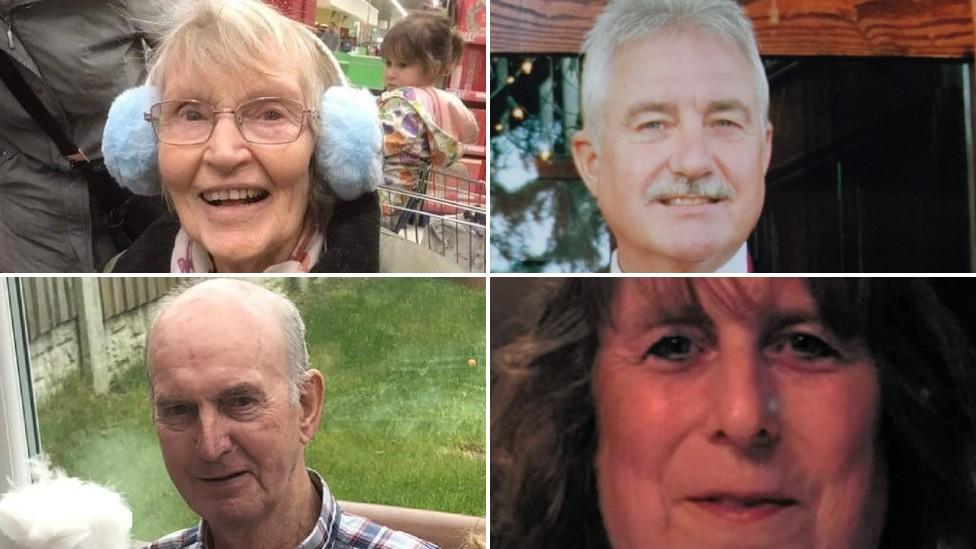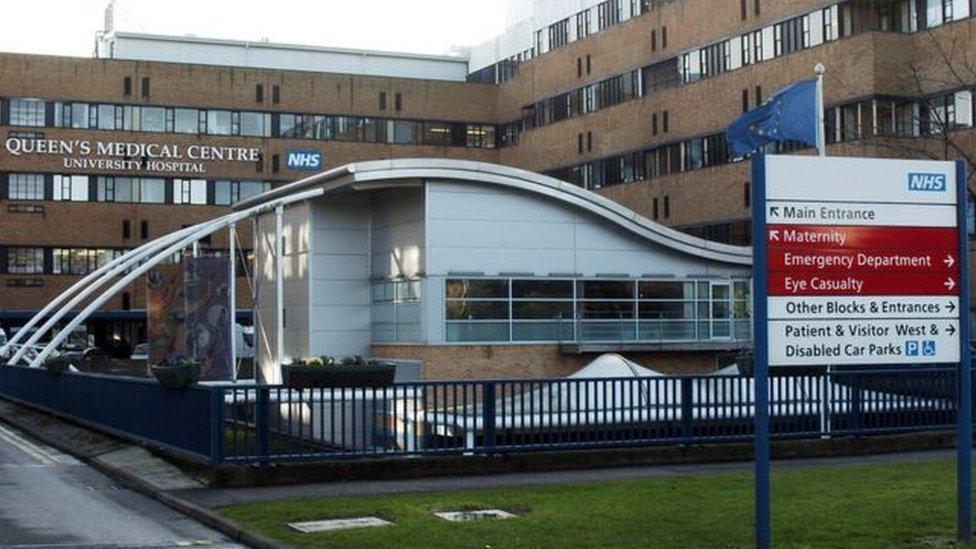Coroner calls for action over Nottingham endoscopy deaths
- Published

Anita Burkey, Peter Sellars, Carol Cole and William Doleman (clockwise from top left) died after an ERCP
A coroner is demanding action from a hospital trust to prevent future deaths after four patients died following the same procedure.
The patients all died after a procedure called an endoscopic retrograde cholangiopancreatography (ERCP).
Assistant coroner Laurinda Bower is to issue a report calling for changes after concerns patients were not properly informed of the risks.
Nottingham University Hospitals NHS Trust said improvements had been made.
William Doleman, 76, Anita Burkey, 85, Peter Sellars, 72, and Carol Cole, 53, died in the space of about six months after undergoing the procedures.
The coroner returned a narrative verdict after a 15-day linked inquest, which found they died as a result of complications of the ERCP - where a tube is passed through a patient's throat to examine and treat possible gallstones and other conditions.
The surgeries were all carried out by the same doctor - gastroenterologist Muthuram Rajaram - but the coroner concluded it was the systems in place to properly gain consent and inform patients of the risks of the procedures that were the issue, not the doctor's competence.

Nottingham University Hospitals NHS trust will have 56 days to come up with an action plan after receiving the coroner's report
The coroner said: "These cases quite rightly provided cause for concern when it was identified that all four deaths had occurred at the hands of the same trainee and within the space of about six months.
"But as the evidence has crystallised during the course of the inquest, the issues appear to be more to do with the system in place in Nottingham rather than with the technical competence of Dr Rajaram."
The hearing was told Mr Doleman should not have undergone the procedure, Ms Burkey was not consulted enough, and Mr Sellars and Mrs Cole were also not told enough about the individual risks.
Trevor Cole, who had been married to Mrs Cole for more than 20 years, said: "Our whole family is devastated at having to adapt to life without Carol.
"None of us were prepared for this. The procedure was only a minor, routine operation and I had no idea that she was so dangerously unwell that evening."
'Should have done more'
Phillip McGough, of Freeths Solicitors, which represented the families of Mr Doleman, Ms Burkey and Mr Sellars, said: "Our clients have been vindicated in their belief that many things went wrong here to varying degrees and there were many questions that needed to be answered.
"[They're] saddened because based on what we've heard over the past three weeks at this coroner's court, so much of what happened was avoidable.
"We can only hope that the lessons learned here are applied by the hospital trust going forward."
John Walsh, deputy medical director at the hospital trust, said: "We would like to offer our sincerest condolences to the families for their loss and we are truly sorry for any shortcomings in the care we provided.
"Although each case is unique, we should have done more to involve families in decisions about patient care as well as taken other actions to manage these complex, high-risk cases.
"We have made significant changes to a number of our trust policies and processes in these areas, including a review of, and changes to, when and how we declare a Serious Incident, to ensure that patients undergoing an ERCP procedure receive the appropriate and timely care they need."
The trust will have 56 days to come up with an action plan after receiving the coroner's report.

Follow BBC East Midlands on Facebook, external, Twitter, external, or Instagram, external. Send your story ideas to eastmidsnews@bbc.co.uk
Related topics
- Published26 November 2021

- Published19 November 2021

- Published17 November 2021

- Published21 April 2021
